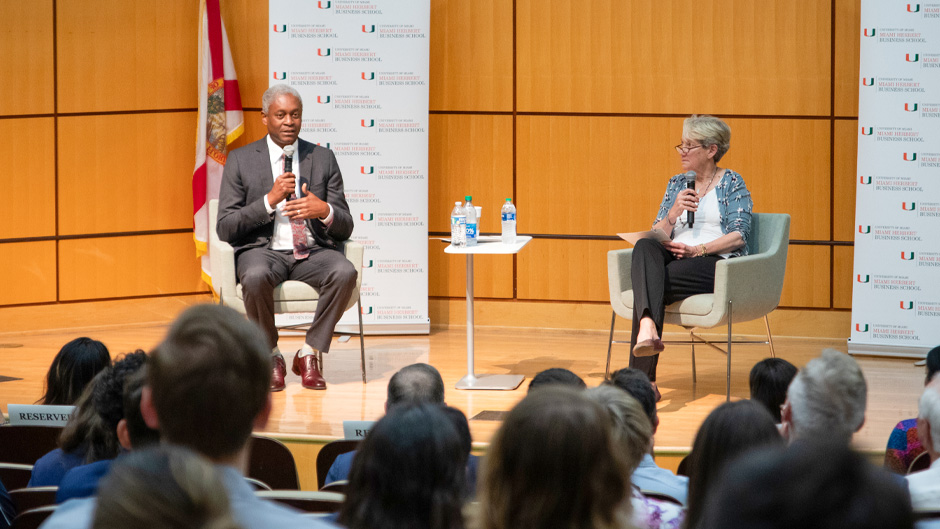Raphael Bostic, president and CEO of the Federal Reserve Bank of Atlanta, summarized his economic outlook in two words—“grateful” and “vigilant”—while touting the ongoing progress toward economic recovery in a talk Thursday evening to the University of Miami Patti and Allan Herbert Business School.
“We’ve made great progress, and the economy is doing quite well today,” said Bostic. “It’s creating lots of jobs. Wage growth is happening and it’s faster than the rate of inflation, so workers are making progress against how the economy is evolving. Inflation is continuing to come down.”
Andrea Heuson, a finance professor, moderated the conversation with the Atlanta Fed chief who, since 2017, has headed the district that includes Florida, Georgia, Alabama, and parts of Louisiana, Mississippi, and Tennessee.
Bostic emphasized the central bank’s two mandates: stabilize prices and maximize employment.
“We’re doing well on the maximum employment basis, and we’ve got progress that we’re seeing in the inflation space—those are ‘good news’ stories,” he added. His commentary reflected qualitative data released April 17 in the Fed’s “Beige Book” or Summary of Commentary on Current Economic Conditions, regional overviews released periodically.
But why is there such a disconnect between public perception and sentiment regarding the economic situation and the significant data indicating growth and inflation reduction? an audience member asked.
“People don’t live inflation, people live prices. When inflation is high, the price becomes high,” Bostic said. “Psychology is a funny thing because people don't do math ruthlessly.”
He noted that when they used to leave the grocery store with 7 cents in the their wallet, and now they have 12 cents, that’s not really going to move the dial in terms of how people experience things. The awareness and sensitivity that things have improved only becomes evident when the savings are, say, 57 cents, he explained.
“I’m the one guy who’s doing the math to know that workers are catching up,” he said. Peoples’ standards of living have been growing, and it will take time, he added.
In that regard, Bostic urged the public to access some of the many real-time tools that the Atlanta Fed has developed to allow anyone to track the economy, such as the Home Ownership Affordability Monitor (HOAM), wage trackers, GDP trackers, and inflation dashboard, many of which can be found on the app Economy Now.
“One of our goals is to help every American, every person in the world actually to be positioned and understand where things are so they are as informed as we are,” Bostic said. “We want to make sure to position everyone to be as successful as possible.”
Bostic said that the “Live Local Act,” legislation recently adopted in Florida that aims to ease zoning restrictions and open land for development for affordable housing, will be “a tremendous experiment.”
“I think we’re just at a point of seeing what comes to market and what gets built. I’m expecting this is another area where we are going to learn a lot, and me and my team are going to be watching closely,” he said.
Heuson invited Bostic to identify behavioral changes impacting the economy that have surfaced in the wake of the pandemic. He highlighted three: one, that many workers, especially those in lower-wage jobs, are now more aware of alternative jobs elsewhere; two, workers are valuing their flexibility and thinking more spatially about where they work; and three, that businesses are needing to shift their strategies away from simple cost minimization in order to be more resilient in the marketplace.
Bostic foresees no recession and, while the central bank has yet to reach its 2 percent inflation target, he urged patience, saying “it’s not yet appropriate” to reduce interest rates. He does envision one rate reduction toward the end of the year.
What are the possible scenarios for the next 18 months in terms of inflation? Heuson asked.
“If inflation stalls out or even starts moving in the opposite direction, away from our target, I don’t think we’ll have any other option but to respond to that. If it seems that the level of restrictiveness that we’re at today is not going to do the job or get the job done, I’d have to be open to increasing rates. That’s just the reality,” he said.
“On the other hand, if inflation were to fall more rapidly, then for me, I would say that’s great. And if it is accompanied with the economy staying strong, that’s even better. It says that maybe we pull forward some of the moves in interest rates. But we can't wait until we get to 2 percent to remove our restrictiveness or else there’s a possibility that we overshoot, and I'd like to avoid that if we can,” Bostic added.
To view the conversation with Raphael Bostic in its entirety, click here.

